|
|
|
|
Did you see Jon Stewart interview CNN’s Christiane Amanpour last week? Amanpour, CNN’s chief international anchor, said we need more journalists on the ground in Gaza. Although Stewart is a comedian (yes, I know), he challenged Amanpour’s stance. He said, actually, there are journalists on the ground in Gaza…but they are getting killed. Amanpour agreed and shared the horrible statistics: almost 100 journalists reporting from Gaza have been killed since October.
Palestinians are still reporting from Gaza, providing vital information on the devastation Palestinians face. This is something North American journalists have been unable to do, mainly because international journalists are not allowed into Gaza, except on controlled expeditions hosted by the Israel Defense Forces.
That makes Palestinian journalists a critical source of information. Yet most mainstream media outlets have not reshared their reporting.
For Amanpour, and many others, we still need our foreign correspondent, “our man in Gaza.” That foreign correspondent is supposed to be a neutral voice with outsider questions. They are assumed to be objective and independent.
But meanwhile, many western journalists including reporters from CNN and the New York Times have spoken out against their newsrooms’ “objectivity,” calling out their unbalanced coverage when it comes to the Middle East. They have said their organizations have pro-Israeli stances. Many have said they feel censored in their newsrooms.
These accusations bring up a lot of questions.
On this week’s podcast episode of Don’t Call Me Resilient, I am joined by two experts to help answer them.
Sonya Fatah and Asmaa Malik are both associate professors of journalism at Toronto Metropolitan University. Their research focuses on newsroom culture, global reporting practices and equity in journalism.
Malik says: “The deep injustice that’s being done is that this work [of Palestinian journalists on the ground] isn’t being amplified…News organizations can amplify those voices, but also augment them and add to them and bring that human perspective to this cold clinical idea of ‘objectivity’ and reportage as we understand it.” Adds Fatah: “Instead of embracing them and instead of standing up and saying this is a huge crisis and we are in support, there has been silence.”
Also this week:
|

|
Vinita Srivastava
Host + Producer, Don't Call Me Resilient
|
|
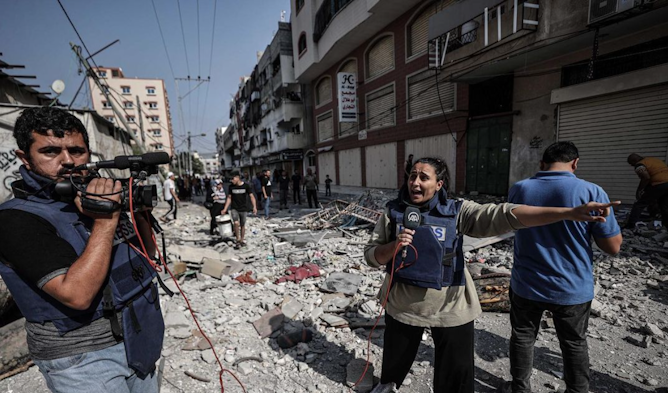
Hind Khoudary, based in the Gaza strip, has been reporting for Al Jazeera English and her own social media channels since Oct. 7, 2023. Media experts say western news outlets, not allowed into Gaza, should create more partnerships with journalists like Khoudary, shown here on Nov. 3, 2023.
Hind Khoudary/Instagram
Vinita Srivastava, The Conversation; Dannielle Piper, The Conversation
Experts say mainstream media coverage of the war in Gaza is severely skewed — with Palestinian voices getting stifled.
|
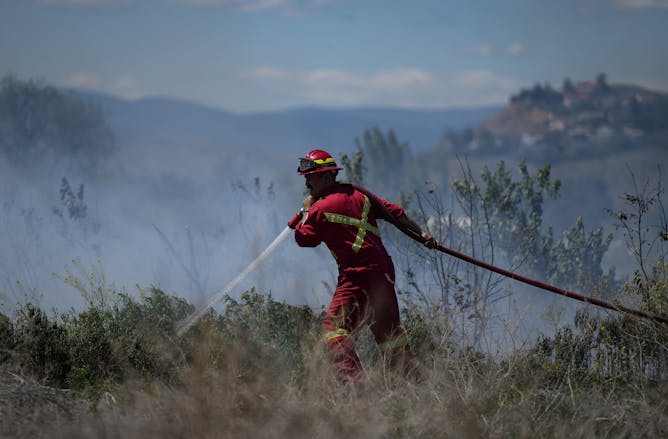
A firefighter directs water on a grass fire burning behind a residential property in Kamloops, B.C., in June 2023.
THE CANADIAN PRESS/Darryl Dyck
Kerry Black, University of Calgary; David Barrett, University of Calgary
In the lead-up to the 2024 federal budget, there was hope for investments in water management and water-related infrastructure. Those hopes were misplaced.
|
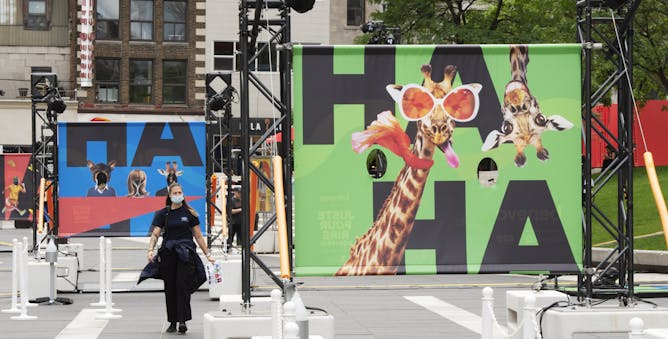
A woman walks by the Just for Laughs festival at the Quartier des Spectacles, in July 2021 in Montréal.
THE CANADIAN PRESS/Ryan Remiorz
Madison Trusolino, Dalhousie University
Expanding the circulation of our comedic content and continuing to invest in the production of stand-up specials — which is relatively low cost — could hugely boost the careers of Canadian comedians.
|

Members of Unifor Local 594 gather for a rally outside the Co-op Refinery in Regina, Sask. in December 2019.
THE CANADIAN PRESS/Michael Bell
Emily Eaton, University of Regina; Andrew Stevens, University of Regina; Sean Tucker, University of Regina
While governments are often blamed for a perceived ‘unjust transition,’ it is actually the industry itself which poses the biggest threat to the future of oil and gas workers.
|
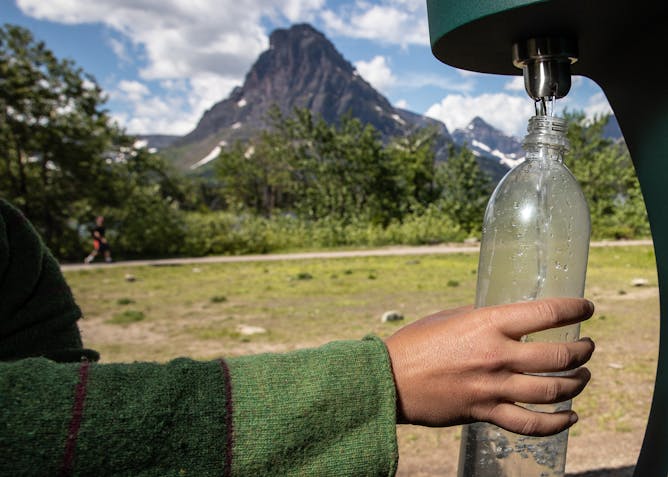
Refilling a reusable water bottle has become routine for many, and education can inspire similar large-scale behaviour shifts. A water bottle filling station in Glacier National Park in northwestern Montana.
(NPS Climate Change Response/Flickr)
Preety Sharma, University of Toronto; Ayeshah Haque, University of Toronto
Sparking global momentum and energy in young people through climate education can go a long way to addressing climate change now and in the near future.
|

Type 2 diabetes is not a singular condition; it exists as a spectrum with several subtypes.
(Shutterstock)
Lili Grieco-St-Pierre, Carleton University; Jennifer Bruin, Carleton University
Type 2 diabetes is not uniform; it’s a mosaic of conditions, each with its own characteristics. Understanding these subtypes may improve treatment plans and help people manage their condition better.
|
La Conversation Canada
|
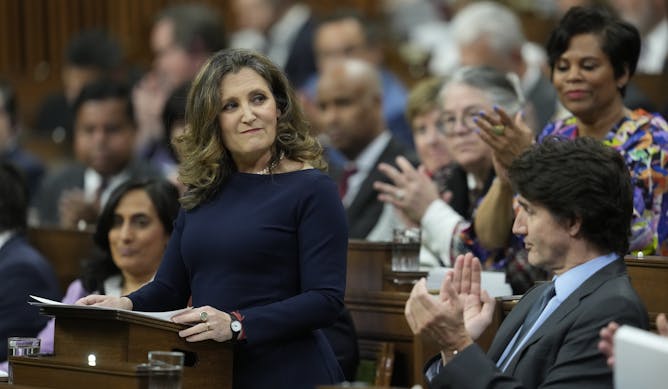
Chrystia Freeland, ministre des Finances, présente le budget fédéral à la Chambre des communes à Ottawa, le 16 avril 2024. Le budget contient des mesures pour les jeunes qui souhaitent accéder à la propriété.
La Presse canadienne/Adrian Wyld
Douglas A. Stuart, University of Victoria
Le gouvernement fédéral souhaite aider les jeunes générations à relever les défis de l’accessibilité au logement et du coût élevé de la vie. Le budget tient-il ses promesses ?
|

À la retraite, il est important de rester actif. Les passe-temps peuvent y contribuer. Mais encore faut-il choisir le bon.
(PeopleImages.com - Yuri A/Shutterstock)
Alison Bishop, University of East London
Les passe-temps peuvent accroître le bien-être à la retraite et contribuer à éviter l’isolement et l’oisiveté. Il faut toutefois bien le choisir.
|
Culture + Society
|
-
Mark Robert Rank, Arts & Sciences at Washington University in St. Louis
With low-scoring games and a preponderance of deflected shots, randomness is much more likely to color NHL teams’ records than those of squads in the other four major US pro sports leagues.
|
|
Health
|
-
Sonja Falck, University of East London
One study found 86% of young people had gone through a friendship breakup.
|
|
|
|
|
|
| |
| |
| |

|
| |
| |
| |
| |
| |
| |
|
|
|
|
|
|
|